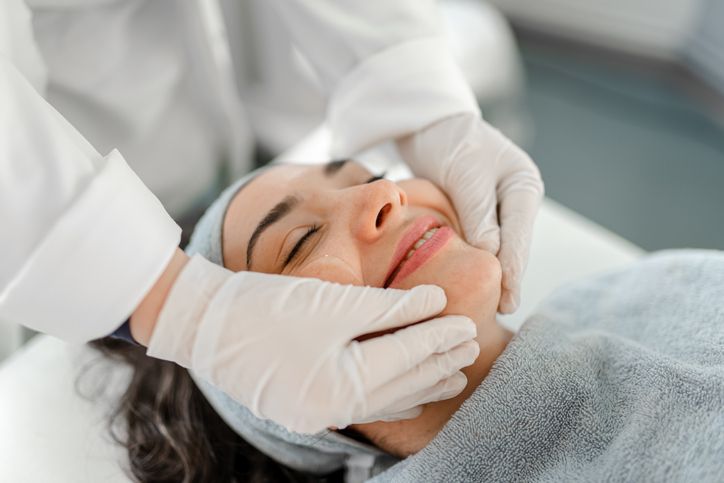Microbiome and Folliculitis: Understanding Their Impact on Skin Health
As a beautician, you're likely aware of the delicate balance required to maintain healthy skin. One of the most fascinating areas of skincare that has gained attention recently is the connection between the microbiome and folliculitis. This article aims to delve into this relationship, providing insights that can enhance your skincare regimen and client consultations.

What is the Microbiome?
The microbiome refers to the collection of trillions of microorganisms, including bacteria, fungi, viruses, and their genetic material, that live on and inside our bodies. The skin microbiome, in particular, plays a crucial role in protecting against pathogens, educating our immune system, and breaking down natural products.
Understanding the skin's microbiome is essential for beauticians aiming to address various skin conditions. It's a delicate ecosystem that, when balanced, contributes significantly to skin health. However, when disrupted, it can lead to issues like acne, eczema, and folliculitis.
What is Folliculitis?
Folliculitis is an inflammation of the hair follicles, often caused by bacterial or fungal infections. It can result in itchy, painful, and sometimes pus-filled bumps on the skin. This condition can be particularly bothersome for clients, affecting their confidence and comfort.
For a more in-depth understanding of folliculitis, you can refer to [HealthDirect's comprehensive guide](https://www.healthdirect.gov.au/folliculitis), which offers valuable insights into its causes, symptoms, and treatments.
The Link Between Microbiome and Folliculitis
The connection between the microbiome and folliculitis lies in the balance of the skin's microbial environment. When the skin's microbiome is disrupted, harmful bacteria can overpopulate, leading to infections and inflammation. This disruption often results from factors such as poor hygiene, excessive use of antibiotics, or harsh skincare products.
As a beautician, understanding this link is vital. It allows you to provide informed advice to clients, helping them maintain their skin's natural microbiome balance and reduce the risk of developing folliculitis.
Maintaining a Healthy Microbiome
Maintaining a healthy microbiome involves a combination of proper skincare routines and lifestyle choices. Here are some tips:
- Gentle Cleansing: Encourage the use of mild, non-stripping cleansers that preserve the skin's natural oils and microbiome.
- Probiotic Skincare: Recommend products containing probiotics, which can support a balanced microbiome and improve skin health.
- Avoid Over-exfoliation: Excessive exfoliation can disrupt the microbiome and weaken the skin barrier, making it more susceptible to infections.
- Healthy Diet: A balanced diet rich in fruits, vegetables, and whole grains can support the body's overall health and, consequently, the skin's microbiome.
For more tips on maintaining healthy skin, consider reading about the [importance of avoiding shared personal items](https://livananatural.com/blogs/news/avoiding-shared-personal-items) and how it can prevent the spread of bacteria.
Treating Folliculitis
When it comes to treating folliculitis, early intervention is key. Mild cases often resolve on their own, but persistent or severe instances require medical attention. Here are some general treatment approaches:
- Topical Antibiotics: These can help clear infections and reduce inflammation.
- Antifungal Creams: Useful for folliculitis caused by fungal infections.
- Warm Compresses: Applying warm compresses can soothe irritation and promote drainage of pus-filled bumps.
- Regular Dermatologist Check-ups: Encourage clients to have regular skin evaluations to manage and prevent folliculitis. For more on the importance of these check-ups, see [this article](https://livananatural.com/blogs/news/regular-dermatologist-check-ups).
Preventive Measures
Prevention is always better than cure. To help clients avoid folliculitis, suggest the following:
- Shaving Techniques: Advise on proper shaving techniques and tools to prevent irritation of hair follicles.
- Hygiene: Stress the importance of regular washing and proper drying of the skin to prevent bacterial and fungal growth.
- Clothing Choices: Recommend breathable fabrics that reduce friction and moisture buildup.
For more detailed prevention strategies, consider the [guidance on avoiding shared personal items](https://livananatural.com/blogs/news/avoiding-shared-personal-items), which is crucial in preventing the spread of infections.
Conclusion
Understanding the intricate relationship between the microbiome and folliculitis can significantly impact the way beauticians approach skincare. By promoting healthy skin practices and being aware of the factors that disrupt the microbiome, beauticians can help clients maintain healthy, beautiful skin.
For more information on skin health, you might find Healthline's article on folliculitis helpful. It's essential to stay informed and continuously educate yourself and your clients about the latest skincare developments.

FAQ
What causes an imbalance in the skin microbiome?
An imbalance in the skin microbiome can be caused by factors such as harsh skincare products, overuse of antibiotics, poor diet, and environmental stressors. Maintaining a gentle skincare routine and a balanced diet can help preserve the microbiome.
How can I tell if I have folliculitis?
Folliculitis often presents as red, inflamed, and possibly pus-filled bumps around hair follicles. It's important to consult a dermatologist for an accurate diagnosis and appropriate treatment.
Can probiotics help with skin conditions?
Yes, probiotics can support a balanced skin microbiome and may help improve conditions like folliculitis and acne. Incorporating probiotic-rich products into your skincare routine can be beneficial.

